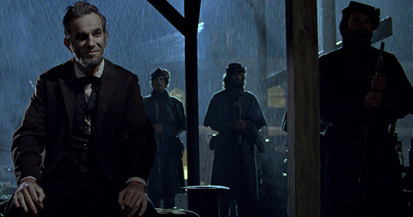|
|
Movie Review: LincolnBy Matthew HuntleyNovember 26, 2012
Steven Spielberg has obviously taken on the enormous task of bringing Abraham Lincoln to the big screen. Hitherto now, there has never been a major motion picture about America’s most iconic figure. If you were to ask even the most elementary students of United States history, they could probably tell you Lincoln was the 16th president and describe what he looked like – tall, skinny, black bearded, wrinkled, and had a constant twinkle in his eye. They could also tell you of his signature top hat. That Spielberg and his lead actor, Daniel Day-Lewis, are able to make us see beyond these superficialities and realize the convictions and feelings of a living, breathing man is somewhat of a miracle, although, given their caliber of talent, not exactly surprising. There was so much to Lincoln’s life that Lincoln itself feels like the closing volume of a much longer biopic. I can easily envision two other films being made about him, one that chronicles his upbringing and the other his rise to political power. But Spielberg and screenwriter Tony Kushner, working from the novel Team of Rivals: The Political Genius of Abraham Lincoln by Doris Kearns Goodwin, have decided to focus on the last four months of Lincoln’s life, when he was just re-elected to his second term, despite the on-going and unpopular Civil War. They delve into Lincoln’s greatest lasting legacy - his commitment to end slavery, which he championed not for political reasons but because he believed that it was simply wrong for one man to own another. The consequences of freeing blacks and how much it would change the fabric of the United States weren’t of Lincoln’s immediate concern. This attitude frightened many people because they knew how much adjustment and reconstruction that would accompany recognizing blacks as equal citizens. But in a way Lincoln didn’t care; his foremost intention was to end the cruelty, injustice and prejudice against people whom he thought were equal not only in the eyes of the law but in the eyes of God and nature. Come hell or high water, he was going to get the 2/3 majority of votes from the House of Representatives to pass the 13thamendment. “I am the President of the United States, clothed in great power! You will get me my votes,” he sternly said to his constituents.
|

|
|
|

|
Thursday, April 25, 2024
© 2024 Box Office Prophets, a division of One Of Us, Inc.


